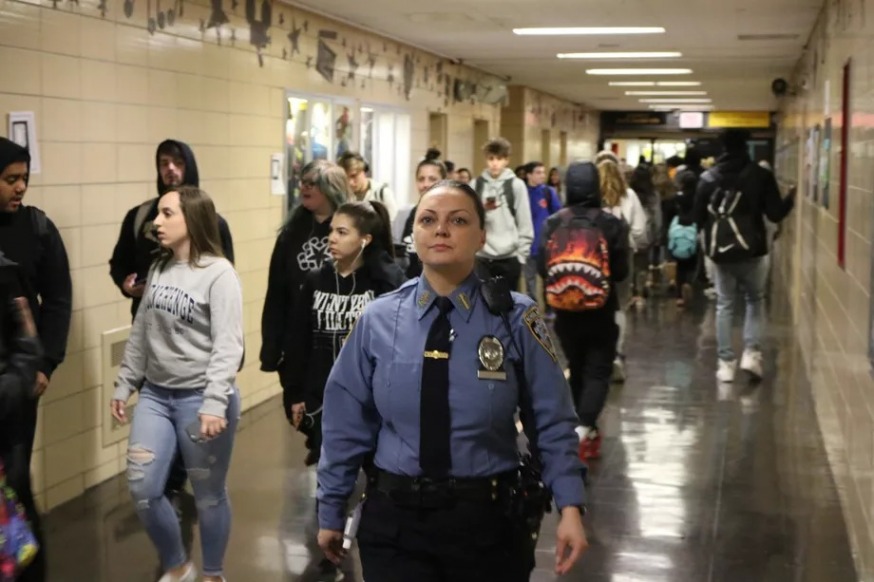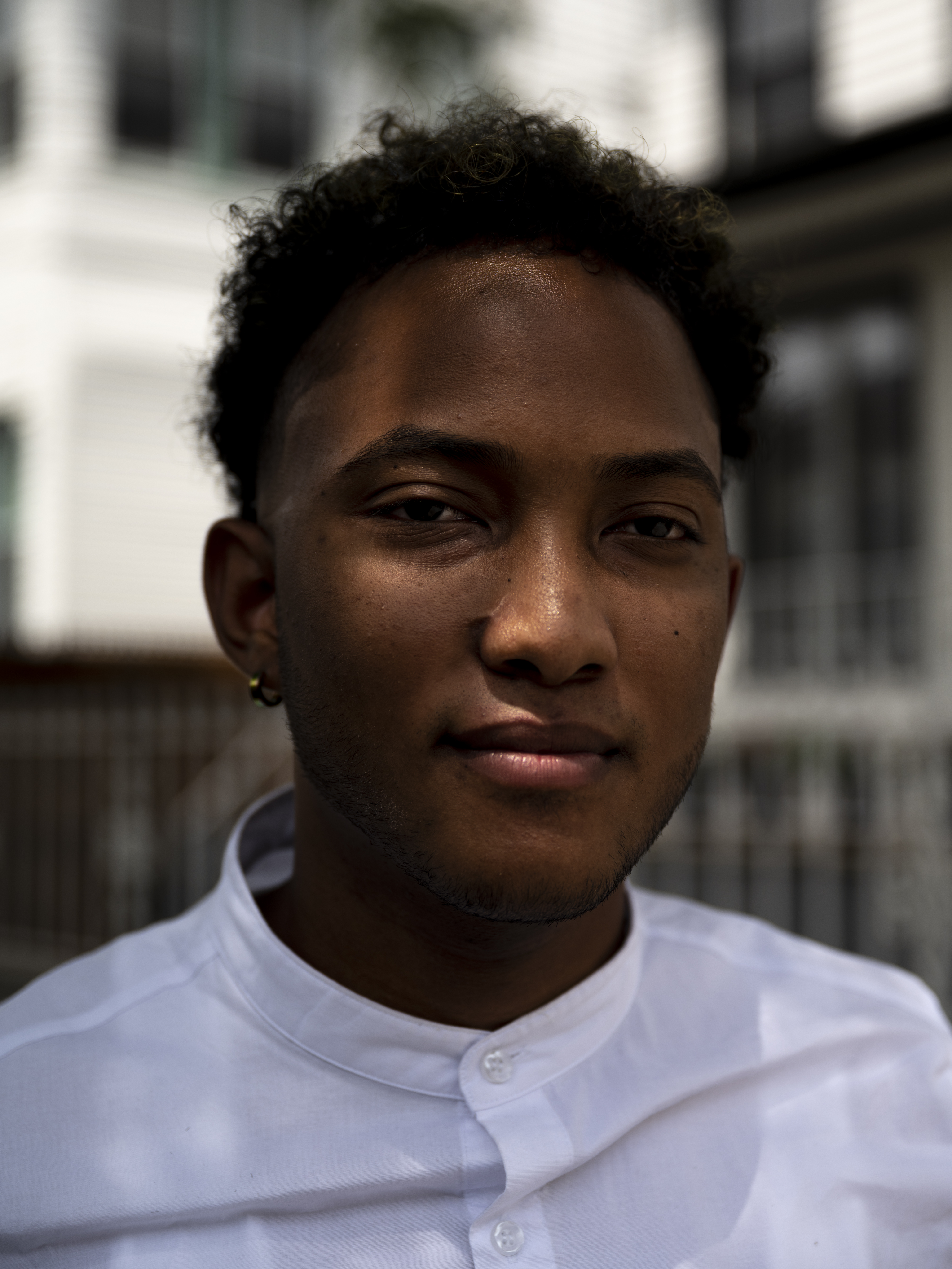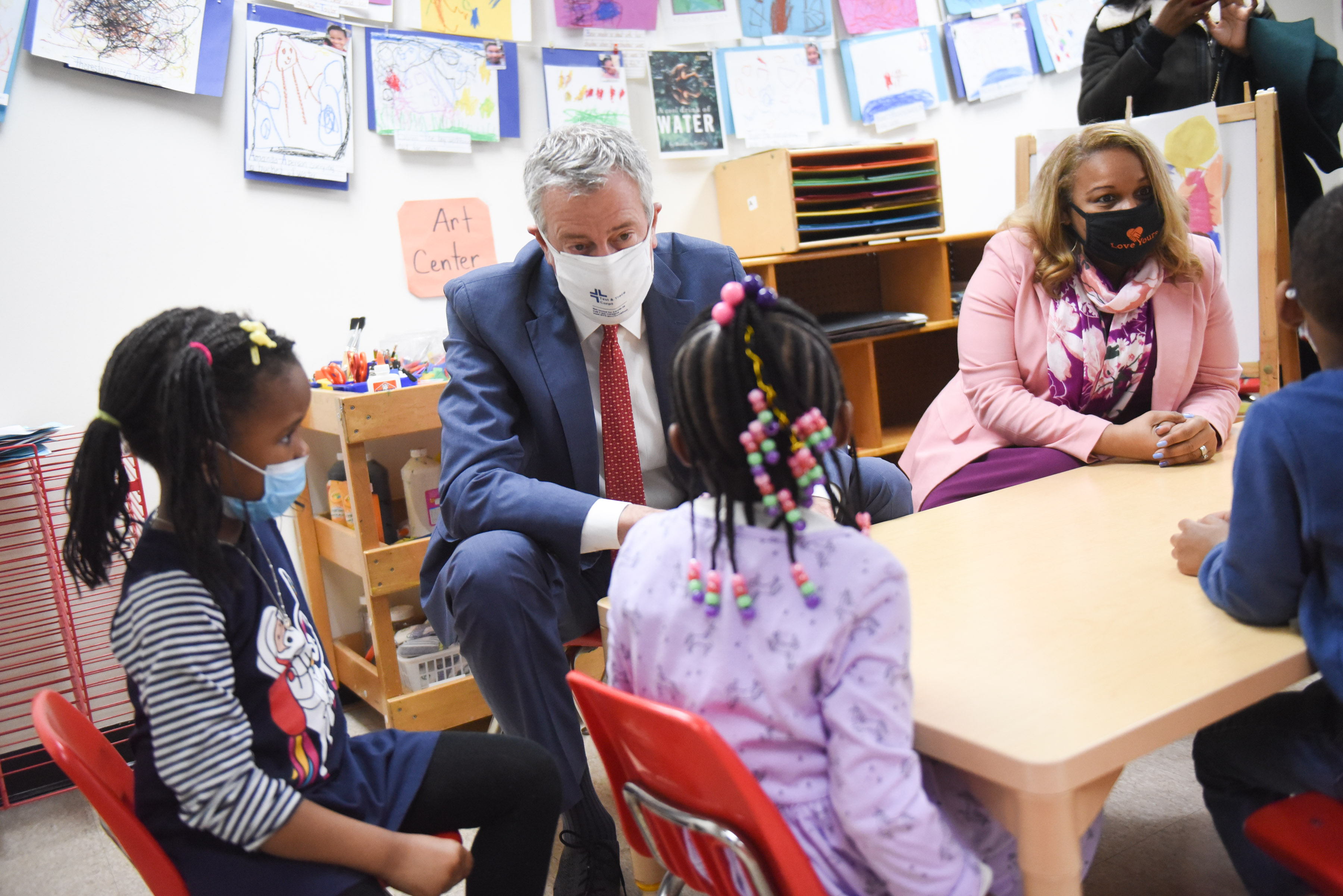
A school safety agent at Staten Island’s New Dorp High School | Alex Zimmerman/Chalkbeat

This article was originally published
by The CITY on Aug 22
BY Eileen Grench
The restart of fully in-person public school classes in less than a month will bring the return of nearly a million students — along with more than 4,000 school safety agents.
That’s reignited a raging debate over what role, if any, cops should have in classrooms, at a time when many children are especially vulnerable and anxious as the city slowly emerged from the COVID crisis.
Last summer, following mass protests against over-policing, Mayor Bill de Blasio promised to shift oversight of school safety agents from the NYPD to the Department of Education by June 2022 — a move opposed by the agents and decried by advocates who want them removed altogether.
Now, two years since the last “normal” first day of school, the argument over what keeps kids safe is being heated by physical-distancing and pandemic-related mental-health concerns, a historic reckoning on police brutality and a spike in shootings as the economy and social programs falter.
“We’re really concerned about the emphasis on return to ‘normal,’ because what was considered normal really wasn’t working well for a lot of kids,” said Johanna Miller, director of the New York Civil Liberties Union’s Educational Policy Center, which has long fought to remove police from schools.
“We’re really worried that there’s not enough energy spent on thinking about how to make the system safer, better, kinder for every kid,” said Miller.
Disparities in Who Gets Policed
According to the NYCLU, Black and Hispanic children were the subject of nearly 90% of police interventions at schools in the 2018-19 school year, the last full pre-pandemic academic year, and 90% of arrests in 2019. Black and Hispanic students, meanwhile, made up 66% of the public school population.
Overall, arrests and restraints of schoolchildren had been falling before the pandemic, according to NYPD data and an NYCLU analysis of those numbers.
Much of that can be attributed to Mayor Bill de Blasio, who despite his reluctance to completely disband the school police force, has supported a few reforms.
In 2019, City Hall, the DOE and the NYPD signed a long-awaited “memorandum of understanding” agreement to limit the circumstances under which school staff should call safety agents or when those agents could make arrests. The mayor and previous Schools Chancellor Richard Carranza also pushed for limiting suspensions and taking a “restorative justice” approach to discipline.
Social justice advocates note that, despite these reforms, use of force by school safety agents continues to be disproportionately leveled against children of color. The NYCLU’s analysis of the NYPD data points out that “since the implementation of the new MOU in summer 2019, the proportion of [school safety agent] incidents involving Black and Latinx students actually slightly increased.”
And this past June, a new analysis of city policing data by the nonprofit Advocates for Children showed that police involvement in “child in crisis” incidents — where students are taken to hospitals in response to emotional distress — were on the rise pre-pandemic. They’d risen from 2,700 incidents in the 2016-2017 school year to about 3,500 incidents in the 2017-2018 school year, the Daily News first reported.
There were particularly high rates for Black students and for those in schools that serve youth with special needs.
But proponents of school policing still say that safety agents are necessary to protect students from harm.
‘Walking Into a Jail’
Some point to a particularly terrifying moment of violence in April when 17-year-old Devonte Lewis was shot and killed outside Urban Dove Charter School in Midwood, Brooklyn. As a charter school, it does not employ NYPD safety agents.
Jai Nanda, the executive director of Urban Dove, contends that the shooting should not be a part of the school safety debate.
“Because the people who shot the student were not students in our school, it didn’t happen in our school, it didn’t happen during school. So it’s a little bit misleading,” Nanda told THE CITY. “We could have had five police officers in our building and they wouldn’t have been at the scene of this.“
Urban Dove does bag checks, and uses metal-detecting wands, but only employs one outside security guard, according to the school.
Liyah Rivera, 19, a senior who was there the day of shooting, initially appreciated the lack of NYPD safety agents.
When the Brownsville teen first transferred to Urban Dove, it was a relief not to feel “like walking into a jail,” she said.

Liyah Rivera, who just completed her senior year in high school, takes part in a summer employment program in DUMBO, July 8, 2021. Ben Fractenberg/THE CITY
Rivera previously attended Brooklyn’s Franklin K. Lane High School, which has a heavy presence of police officers at its Cypress Hills campus.
There, Rivera and her peers had to constantly “check your back” because they believed safety agents played favorites, even “allowing children to fight, kind of amping it up,” she told THE CITY.
Since the shooting, Rivera said she’s “50/50” in terms of whether safety agents should be present in schools, but she’d like to see a more community-oriented strategy toward stemming violence.
‘A Sanctuary of the Mind’
In a June survey of city youth by the nonprofit Citizens’ Committee for Children, nearly 45% of young New Yorkers surveyed said police made them feel safer — a sign that despite protests, students’ opinions on school cops aren’t unanimous .
Still, another survey of New Yorkers 21 and under in April by the Urban Youth Collaborative found that 76% of respondents ranked security officers as the last area they would invest in at school, and nearly two-thirds wanted school cops removed.
In that same survey, 78% of Black students reported having or knowing someone who had a negative experience with school police.
Dariel Infante, a 17-year-old high school student in Queens, told THE CITY in Spanish that his own experiences as an immigrant in a heavily policed high school made him decide that safety agents are more harmful than helpful.
“When we immigrants see the police, we get scared, sometimes we panic … if we do something and the police don’t like it, if we disrespect them, our immigration status in this country could be at risk,” the Dominican Republic-born teen said.

Dariel Infante at home in Richmond Hill, Queens. July 2, 2021. Hiram Alejandro Durán/THE CITY
Infante said he’s seen incidents where calm students were driven to panic by gruff treatment from school safety agents at his school. He wishes there were more counselors than cops.
“School should be a sanctuary, a sanctuary for the mind,” he said, adding that’s why he’s participated in multiple protests against school policing.
De Blasio Refunds the Police
After the city exploded into protests against police brutality in May 2020 following the killing of George Floyd by a Minneapolis cop, calls from protesters like Infante grew louder than de Blasio could ignore.
Unlike some other major cities like Oakland and Minneapolis, which disbanded their school safety programs in the wake of the Floyd protests, de Blasio left New York’s safety agent budget, staffing numbers and limited oversight largely untouched.
But the mayor did pledge to move the oversight of school safety agents from the NYPD back to the city’s Department of Education for the first time since 1999.
He also promised to fund an additional 500 social workers at city schools in his new budget unveiled in July, as well as create 100 new so-called community schools for high-needs children, where students would have direct access to social services by local nonprofits. De Blasio also used federal dollars to boost tutoring programs.
But the mayor has been criticized for making the transition slowly — and the program’s ultimate fate will likely rest with Democratic mayoral candidate Eric Adams, a former police captain.
The mayor’s office did not respond to requests for comment, but a DOE spokesperson said the moves are in progress.

Michael Appleton/Mayoral Photography Office Mayor Bill de Blasio appointed Schools Chancellor Meisha Porter (right) to the position in February.
“We are well on our way to hiring over 500 new social workers and adding over 100 more community schools to ensure every student has a caring adult to go to when in crisis,” the spokesperson, Nathaniel Styer, wrote in a statement to THE CITY.
Styer did not say whether the social workers would be in place by Sept. 13, the first day of school.
“Our years of focus on the social, emotional, and mental health of our students means a safe and welcoming reopening for all students,” he said.
School safety agents themselves have already seen some changes since the mayor’s announcement: They were required to undergo training in conflict resolution, restorative justice and implicit bias last spring — part of the eventual transition, according to the education department.
But the coming new school year presents “many challenges,” said Gregory Floyd, president Teamsters Local 237, the union that represents safety agents.
He pointed to a shortage of 650 agents compared to the last full school year and uncertainty over still-to-be-confirmed coronavirus mandates that “are viewed as inadequate by some,” he told THE CITY.
His members are dealing with “critics who contend that they have no place in those buildings,” fueling mental stress in an already demanding job, he added.
“School safety agents will try to ignore the critics and meet the challenges to help recover, return, and restore a sense of normalcy to the more than one million public school students,” said Floyd.
The NYPD said it’s “working with City Hall and the Department of Education regarding staffing vacancies of school safety agents,” but referred questions on the logistics of school safety work in the time of COVID to the Mayor’s Office, which did not respond.
Opting Out
At least one young Brooklynite won’t be present on the first day of school because of the policing question. His mother felt that the way school cops harshly interacted with her second-grader in a local public school was enough to remove him from the public school system completely.
“I used to volunteer in a prison, and it’s a horrible place, and the schools really, in a lot of ways are not so different,” said Camille Acey, 40, the director of a tech company who has now joined a Brooklyn homeschooling resource center.

Courtesy of NYCLU/Kainat Ali Students with the New York Civil Liberties Union’s Teen Activist Project rallied in front of Gracie Mansion on Aug. 17.
She said while friends’ children in private school reported getting a warm reception and bagels when starting school, her son’s experience was starkly different.
“These children just [are] getting normalized about someone sort of barking orders at them and making demands of them, that sometimes even defy the wishes of their parents,” she told THE CITY. “It’s just really scary to me, so I just wanted to keep my kid close and away from people like that.”
THE CITY is an independent, nonprofit news outlet dedicated to hard-hitting reporting that serves the people of New York.
